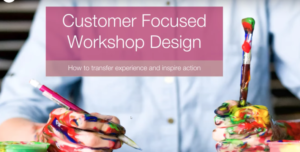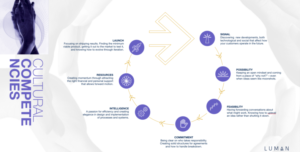With everything going on in the world, it makes sense that stress levels are high. We carry that stress from our family life to our work meetings and back again. What if there was a way for you to help your teams relieve some of that stress without the backlash of differing opinions on how things should be? Would you open dialogue about difficult topics if you knew it would diffuse anxiety levels?
The mindset you have determines your behavior. It’s a beautiful thing that you can allow yourself to work from a flow state so that you don’t always have to be in a constant state of deciphering trustworthiness of people and situations. However, your mindset can have a limiting effect on your ability to build trust and open communication with your teams.
In this article, re-written from a live video, we share some of the mindsets you need as a leader to support stress-alleviation and create psychological safety with your teams.
Be Intolerant of Intolerance
I want to bring in a historic framing that looks at what we are not okay with. As a civil society, we have social contracts. These show up in all aspects of life, whether we are walking down the street or are in organizations. Sometimes social contracts get broken. When they do, we are faced with a choice. Do we tolerate the break or are we intolerant of it?
The Austrian-British philosopher, Karl Popper discusses this in his political philosophy The Open Society and Its Enemies and defines this very societal phenomenon.
This phenomenon is called the paradox of tolerance which is defined as such: unlimited tolerance must lead to the disappearance of tolerance. If we extend unlimited tolerance, even to those that are intolerant, if we are not prepared to defend a tolerant society, against the onslaught of the intolerance, that the tolerant will be destroyed, and tolerance with them.
In other words, if there is no limit to our tolerance of the intolerant, we are going to lose our society.
Act From Your Values
What does this have to do with organizations? Companies have regulations and by-laws. Additionally, there is a civil society. This society you are a part of determines what you are ok with and what you are not ok with. Organizations get to take a stand for values. Therefore, there needs to be a structure for having difficult conversations.
“Many leaders are unsure about how to discuss current events that elicit strong opinions and emotions from their team members and so their default is to say nothing or make only a passing comment. Resist that tendency.”
This Harvard Business Review article gives some great advice on how to open the narrative.
It’s important to understand that every team member might have a different context. You might get triggered by what’s going on in the world. It’s important to remember that having differing opinions is actually a beautiful thing.
Here’s a brief description of the HBR article and what you can do now to support your people.
- Create space for the conversation
- Acknowledge the difficult times and it’s effect
- Personalize – tell your own personal story
- Offer Support – let them know you are there
- Reinforce Values – what we are against and what we are for
- Highlight Resources – you don’t have to have all the answers but you can gather resources to support your team
Accountability is Held
When you set aside time to have these conversations, it’s useful to create boundaries. This opens up the space for people to feel heard, seen and valued in these challenging times.
The way we define accountability differs greatly from how most people define it. We all know that accountability is an accounting of. Did it happen? Did it not happen? If it didn’t happen, were there consequences?
But there’s another piece to accountability which is that accountability is held. It’s vital to understand that accountability without being held can be unclear and confusing. When a team integrates the hold portion, they create the conditions necessary for success.
We divide hold accountable into seven capacities.
Focusing Out
Put the attention on others. Make sure this conversation is not about your need to express and unburden yourself. Do that elsewhere so you can focus on your team and create the space for them.
Create Psychological Safety
Put a boundary on the conversation. For example, set a time frame for the entire conversation and for how long each person will speak. Allow people to evolve, change their minds and have a different opinion or experience. Most importantly, name that whatever is said in the room will not leave the room.
Create Shared Purpose
Everyone needs to know why they are here and what the social conduct and values are. When you create this purpose together, everyone in the room can relax.
Clarity
It’s important to know what’s in and what’s out. Intolerance is out. Harassment is out. Be clear about what behavior is acceptable and not.
Authenticity
Speak authentically about your own experience. Vulnerability creates the space for other people to be vulnerable.
Agreements
Agreements create the opportunity for true accountability. Clarify agreements ahead of time about what’s fair game in the conversation, for instance. Opening up in a free for all is not the best way to create a psychologically safe space. Instead, create a sense of completion and closure in a conversation.
Feedback
Feedback, or what we call Feedforward, clearing, and acknowledgements are all about how you can do things differently in the future. Firstly, ask for feedforward on how you might hold these conversations more effectively going forward. Secondly, ask for any acknowledgements about how you showed up that impacted people positively. This allows people to talk about what could have been done better in the conversation without making it about personalizing or challenging what happened in the room.
Don’t Just Do Something, Stand There
-Kat Nadel

The image above is a re-post from The Female Lead who also wrote in that post, “Real conversations and empathy are so important right now.”
Asking your people “How are you?” may seem unproductive. They’ll probably just say, “Fine” like the image above and move on. Instead, ask them a second time. But this time, let them know why you are asking.
Moreover, the challenge with opening this kind of dialogue is what not to do after you hear from a colleague about how they are really doing.
Sometimes their answer may make you uncomfortable. This is an opportunity to hold your reactions back. Take note of them, but hold them. Because when you offer space for someone else to share vulnerably, you must leave your opinions, your advice, your discomfort out of it.
The goal of creating a safe space is to allow other people to fill it with their unique expression without being wronged or shamed for it. Subsequently, it’s within that space where one can discover what’s truly important to them. It’s only then that they can move on with their lives. This is one of the all time greatest gifts you can give to a person – your attention.
You Got This
As leaders, you will have teams with a diversity of viewpoints. There may be intolerant views that you don’t agree with. Therefore, you have an opportunity to be tolerant of people bringing intolerant views while also being intolerant of intolerant actions.
It’s not necessarily going to feel good. This kind of non-reaction requires a developmental progression and growth as a leader. However, the more you practice, the more you will gain.
Good luck out there. Try to create the space for people to express their conclusions based on their history, biology and media intake that are different from yours. We all need space to be heard and seen. Sometimes, just in having our views witnessed we can consider them and even change our minds. This is how we evolve as humans, teams, organizations and the world.
LUMAN stands for “humans with the lights on.”
Creating the future together starts with how humans operate. We offer project based workshops to help you accelerate outcomes while building your high-performing remote team.
Schedule time with us today to talk with us more about how you can connect your team to the future.





